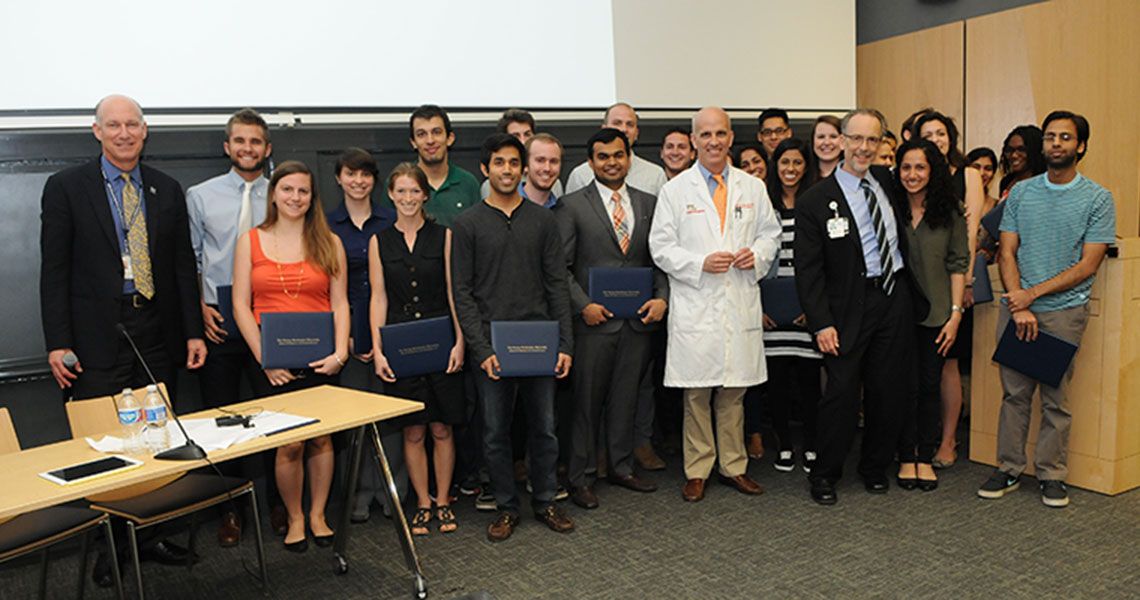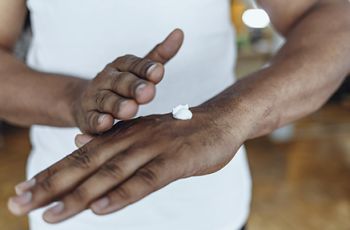“More than seven million children under the age of 18 were living with asthma in the United States in 2009,” said Stephen J. Teach, M.D., M.P.H., chair of the department of pediatrics and professor of pediatrics and emergency medicine, both at the GW School of Medicine and Health Sciences (SMHS) and Children’s National Health Systems (Children’s National). In an exercise aimed at eradicating the disease in children, the M.D. Class of 2018 participated in a multi-day clinical public health project to develop proposals to eliminate the personal, family, and community impact of childhood asthma in Washington, D.C. Small groups of students each had a specific mission: to create an innovative clinical public health proposal to improve one specific factor that related to childhood asthma in D.C.
This exercise, titled “How Physicians Can Help Eliminate Childhood Asthma in Washington, D.C.,” integrates clinical public health into the M.D. program’s revised curriculum. GW SMHS has developed this novel approach, according to Lawrence Deyton, M.D. ’85, M.S.P.H., senior associate dean for clinical public health and professor of medicine at SMHS, so that medical students graduate as clinicians who are equipped to diagnose and care for patients and also know how to exert their role as physicians to assure their patients’ health is optimized in their communities.
“Physicians of tomorrow must have an expanded scope of practice that allows them to treat their patients and the social determinants of their patients’ health. GW is the only medical school in the country educating students to do that using this academic and experiential approach,” said Deyton.
The exercise was an eye-opening experience for first-year medical student Merrick Can. “I never realized how prevalent asthma is in D.C.,” he said, adding that over the course of the exercise, he discovered how many of his fellow classmates suffer from asthma.
As director and principal investigator of IMPACT DC (Improving Pediatric Asthma Care in the District of Columbia) and principal investigator for the NIH/NIAID-funded Inner City Asthma Consortium, Teach delivered the keynote talk, “Childhood Asthma in D.C.: Science, Clinical Public Health and Community Health Overview.”
Even more startling, explained Teach, a renowned researcher, patient advocate, and author, is that “in the same year, 640,000 emergency department visits, 157,000 hospital admissions, and more than 10 million annual lost school days were the result of childhood asthma.”
For Teach, the most interesting aspect of childhood asthma is that there are so many different factors that perpetuate it as a major problem, and no single solution to minimize its impact on patients, families, and the community.
Morbidity due to asthma is highly concentrated in urban environments, explained Teach. “This is a disease that disproportionally affects those children who can least afford to bare it: disadvantaged, urban, minority kids,” he said, “This is a disease of southern Prince George’s County, Southeast D.C., and parts of Northeast D.C.”
Teach’s talk focused on the many intersecting areas related to childhood asthma in D.C.; socioeconomic factors like access to care, quality care, and medication plans, as well as environmental factors like weather changes, air quality, viral infections, and allergens, including dust, mold, pollen, and mice that contribute to childhood asthma.
The lack of primary care in these areas plays a significant role in these children’s access to quality care, according to Teach. “What we see is that these families aren’t getting the primary longitudinal care that they need and instead end up cycling through the emergency department,” he added.
The medical students’ exercise included presentations and lunch discussions with a panel of children and teens with asthma, as well as their families, to give students a firsthand glimpse into what it’s like to live with this chronic condition. “I love to play basketball,” said 8-year-old Noah, alongside his dad, Josh. Noah, who was diagnosed with asthma at six months old, says it limits his ability to play sports. “I start wheezing and can’t run as long as the other kids,” he said. As a parent, Josh, who had little knowledge about asthma and no guidelines for how to treat his son, found the situation frustrating. “In the beginning, we were at Children’s National emergency every three months,” he said. Josh credits Teach and his team at IMPACT DC for educating him about the disease and bringing his son’s asthma under control.
Over the next day and a half, small groups of students were assigned to develop clinical public health proposals in eight different topic areas. Together, these clinical public health proposals were intended to eliminate childhood asthma in D.C. Focus areas included primary prevention, population-wide risk identification and screening, access to quality health care, environmental and community factors, and funding and public health policies.
In addition to learning directly from asthma patients and their families, representatives from each of the eight student groups made field visits to learn from front-line providers, program leaders, researchers, or community and government health workers with responsibility for some aspect of childhood asthma in D.C.
“We learned how asthma disproportionally affects the underserved in D.C., specifically in Wards 7 and 8,” said Mollie Kotzen, a first-year medical student at SMHS. Tasked with risk identification and access to health care as it pertains to childhood asthma in D.C., Kotzen and her group found that a community-based approach would be the most effective way to identify those at high-risk and with limited access to quality health care.
The exercise culminated with each student group developing and presenting a proposal using a modified National Institutes of Health research proposal format. Each proposal was evaluated using a modified peer-review process with the entire class and small group of experts acting as the Peer Review Committee. The expert Peer Reviewers included: Richard J. Simons, M.D., senior associate dean for M.D. programs at SMHS; Mark Batshaw, M.D., associate dean for academic affairs and professor of pediatrics at SMHS, and chief academic officer and physician-in-chief of Children's National; Leo Chalupa, Ph.D., vice president for research at GW; and Katie Horton, RN, M.P.H., research professor in the Department of Health Policy at the Milken Institute for Public Health at GW.
“As a medical student and future physician, I need to know how to navigate the proper channels to get my research projects funded,” said Can, whose group had to tackle funding and public health policies. “This exercise was an opportunity for me to learn more about process and the different aspects of health care.”
To cap off the exercise, Jeffrey S. Akman, M.D. ’81, RESD ’85, vice president for health affairs at GW, Walter A. Bloedorn Professor of Administrative Medicine, and dean of SMHS, presented the “Dean’s Award for Innovation in Clinic Public Health: Childhood Asthma.” The award went to the student group that received the best Peer Review Committee score. And in this exercise, there was a tie for the top score; the Dean’s award went to two groups. One was the Primary Prevention group for their proposal for delivery of early allergen exposure to develop population immune tolerance. The other was the Funding and Public Health Policy group for their innovative funding program to focus resources to eliminate childhood asthma in D.C.
IMPACT DC — led by Teach and his team of clinicians, community workers, and families — has increased asthma awareness and education for patients and families in the D.C. area. The program has lessened the need for emergency room visits and hospital stays and also improved the lives of children with asthma in D.C.
In closing, Teach stressed to the first-year medical students that there is still work to be done and, at the end of their work, they now have both the knowledge and the clinical public health skills to do that work.



